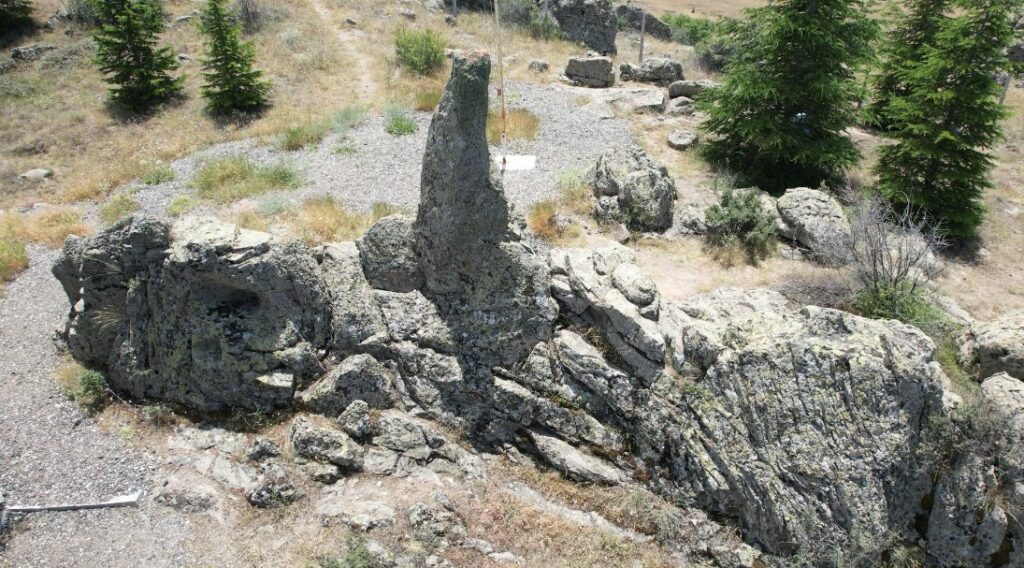Drumming has been forbidden in this village for centuries
For centuries, drums have not been played at weddings due to the legend that Oruç Gazi, whose tomb is located in the village of Taşlıca in the district of Kızılcahamam in Ankara, is disturbed by the sound of the drum and that a bridal procession turned into stone while passing by with drums…

Oruç Gazi, whose tomb is located in Taşlıca village of Kızılcahamam district in Ankara, has not been played at weddings for centuries due to the legend that he was disturbed by the sound of the drum and a bridal procession turned into stone while passing with drums. Taşlıca village hosts many different legends. The Bridal Rock legend, where the bridal procession turned into stone when passing with drums, has been passed down from generation to generation for centuries. The Bridal Rock in the village takes its name from the interesting story it has. The appearance of the rock resembles a bride on a horse when viewed from a distance. According to the legend, a long time ago, as the bridal procession was advancing through the village, Oruç Gazi, who was praying at that time, was disturbed by the sound of drums and pipes. Despite warnings, the wedding procession continued with more drum beats. Everyone present there turned into stone. Due to the legend, drums have not been played at weddings in the village for centuries. Ali İhsan Gökmen, a resident of Taşlıca village, who states that Oruç Gazi lived in the 1200s during the reign of Alaaddin Keykubat, said, ‘Oruç Gazi dealt with religious matters in these regions. Oruç Gazi, a branch of our saints at that time, was granted to our village by the will of Allah. He established his lodge here and trained students here. That’s why he is a great figure that we have a lot of interest and respect for, and we visit, pray and respect on holidays and special occasions.’ Birol Özdemir, the headman of Taşlıca Village, who stated that drums have not been played in the village for many years, said, ‘This is known as a legend throughout Turkey. But as we know it; there was a person named Oruç Gazi who lived here, and there is also the Red Midwife. Our Oruç Gazi is here when the bridal procession passes by while he is in worship. As the bridal procession passes, Oruç Gazi cannot perform his worship with awe and becomes very uncomfortable. In the meantime, the bridal procession increases the dosage of this entertainment. Therefore, these people are warned three times through Allah. The bridal procession still does not comply with these warnings, and it is believed that the bridal procession turns into stone here.’ Expressing that there are misunderstandings when telling the Bridal Rock legend, Özdemir said, ‘It is said that Oruç Gazi warned the bridal procession and then cursed like ‘May Allah turn you into stone’ because the entertainment continued after these warnings. This is wrong because venerable people do not curse. There is no curse from Oruç Gazi.’ ‘Drums are never played at weddings here,’ Özdemir, who stated that this legend has become a culture of Taşlıca village, said, ‘We do not play drums here. For example, when I come with my car, I turn off the radio when I reach the entrance of the village. When going to the tomb of Oruç Gazi or the tomb of the Red Midwife, we lower the volume of the music and drums are never played here. There are various celebrations such as the ‘Sinsin’ game from the ancient Turkish tradition, but drums are never played. In the past, those who said ‘How come drums are not played in this village, I will play drums’ are said to have faced different misfortunes according to the legend. We continue our tradition of not playing drums from around the 1200s to 2024.’ Hikmet Gökmen, who stated that those who tried to play drums in the village in the past had various misfortunes, said, ‘We had a neighbor who played drums and pipes. When the drum team passed through our village, he played his drum by hitting it. We know that he played the drum, saying ‘You are exaggerating here, nothing will happen.’ We know that after playing the drum and then going back to his village, the man became uncomfortable, paralyzed, and died without getting up during that time. This is an incident we experienced. I was born in 1950 and when I was between 10 and 12 years old, this incident occurred. Only that man played the drum, he became uncomfortable, paralyzed, and we know that he died. This is not hearsay, it is something experienced by people of our age.’







